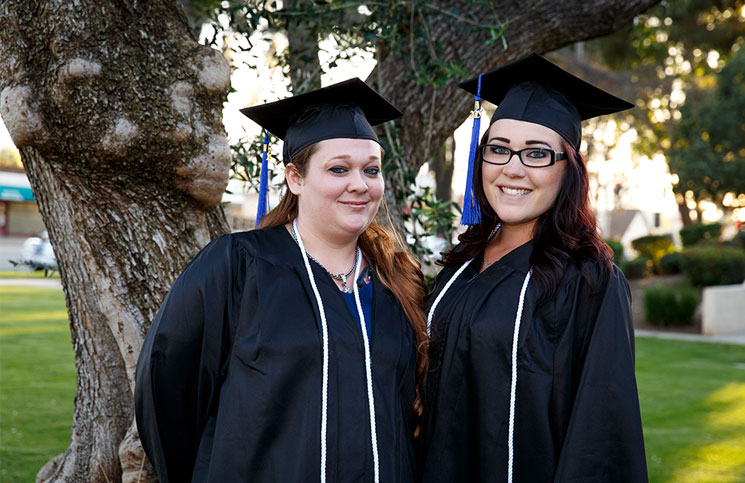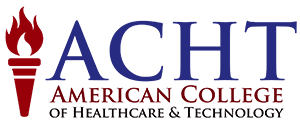Financial Aid

All students are encouraged to apply for financial assistance if unable to meet education costs on their own. Applications and required forms are available in the Financial Aid Office. Applications are considered in chronological order.
American College of Healthcare and Technology participates in the following Federal Financial Aid programs:
- Federal Pell Grants
- Federal Supplemental Opportunity Grant (SEOG)
- Federal Work Study
- Direct Subsidized Loan
- Direct Unsubsidized Loan
- Direct PLUS Loan
Here in ACHT, we do not have an application deadline. For more detailed information, contact the Financial Aid Office. Application forms include Free Application for Federal Student Aid, an Internal Application, a Default Statement, a Residency Questionnaire and a Federal Loan Application, if applicable.
All students who are eligible for Federal Pell Grants, or FFELP Loans may receive awards from these sources and must maintain Satisfactory Academic Progress (SAP) in order to continue to be eligible to receive Federal Student Financial Aid.
- High School Diploma / GED / ATB Test
- Citizen / Eligible Non-Citizen
- Pursuing a Degree / Certificate / Diploma at a participating school
- Demonstrate financial eligibility, if applicable for program
- Statement of educational purpose and Default over payment status
- Not in default / owe refund or repayment
- Not have borrowed in excess of annual or aggregate Title IV loan limits
- Confirmation of registration with selective service (if registration required)
- Maintain Satisfactory Academic Progress
- Possess a valid Social Security Number
In cases where unique or exceptional situations affect your eligibility for federal student aid, federal regulations provide financial aid administrators with the ability to exercise discretion or professional judgment on an individual basis. With appropriate documentation, they can make adjustments to the data elements on the Free Application for Federal Student Aid (FAFSA®) form, specifically the Expected Family Contribution
(EFC), to achieve a more precise evaluation of your family’s capacity to contribute towards your educational expenses. It’s important to note that the Department of Education lacks the authority to override a school’s decision based on professional judgment.
Students may pursue a Professional Judgment decision based upon the following categories:
- “Special Circumstances” which refers to financial situations such as the loss of a job, etc.; and/or,
- “Unusual Circumstances” which refers to the conditions that justify an adjustment to a student’s dependency status based on a unique situation. This is commonly referred to as a “Dependency Override”
A student may have both a special circumstance *and* an unusual circumstance. If a student would like to be considered for an adjustment to their Cost of Attendance or Expected Family Contribution based on a Professional Judgment determination, they will need to meet with the financial aid office for a preliminary assessment and interview and provide any documentation which supports their request. For a more complete list of acceptable documentation, please see the financial aid office. The financial aid office will make a determination as soon as possible but no later than 60 days from the student’s request date.
Below are some instances in which a student and/or parent may seek a Professional Judgment, although these are not the only circumstances where
Professional Judgment may be applicable:
– Loss of employment or decrease in income
– Spouse’s illness or passing
– Medical and dental expenses not covered by insurance
– Unusually high child/dependent care expenses
– Parents enrolled in college
– Tuition expenses for elementary and secondary school
– Loss of benefits
– Male students who failed to register for Selective Service
– Dependency override
To request a Professional Judgment, please visit the financial aid office
Federal Pell Grants are available to eligible undergraduate students who have not yet received bachelor’s degrees or professional degrees, are enrolled in degree or certificate programs, and meet program eligibility requirements. Eligibility is also determined on the basis of financial need. A Student’s Expected Family Contribution (EFC) is used in determining need. The EFC, along with a student’s enrollment status and the length of his or her program of study, determine the amount of the student’s award. Funds an eligible student receives from this program do not have to be repaid.
Please note that the school cannot require the borrower to participate in arbitration or any internal dispute resolution process offered by the institution prior to filing a borrower defense to repayment application with the Department pursuant to 685.206(e); the school cannot, in any way, require students to limit, relinquish or waive their ability to pursue filing a borrower defense claim, pursuant to 685.206(e) at any time; and any arbitration, required by a pre-dispute arbitration agreement, tolls (pauses) the limitations period for filing a borrower defense to repayment application pursuant to 685.206(e)(6)(ii).



